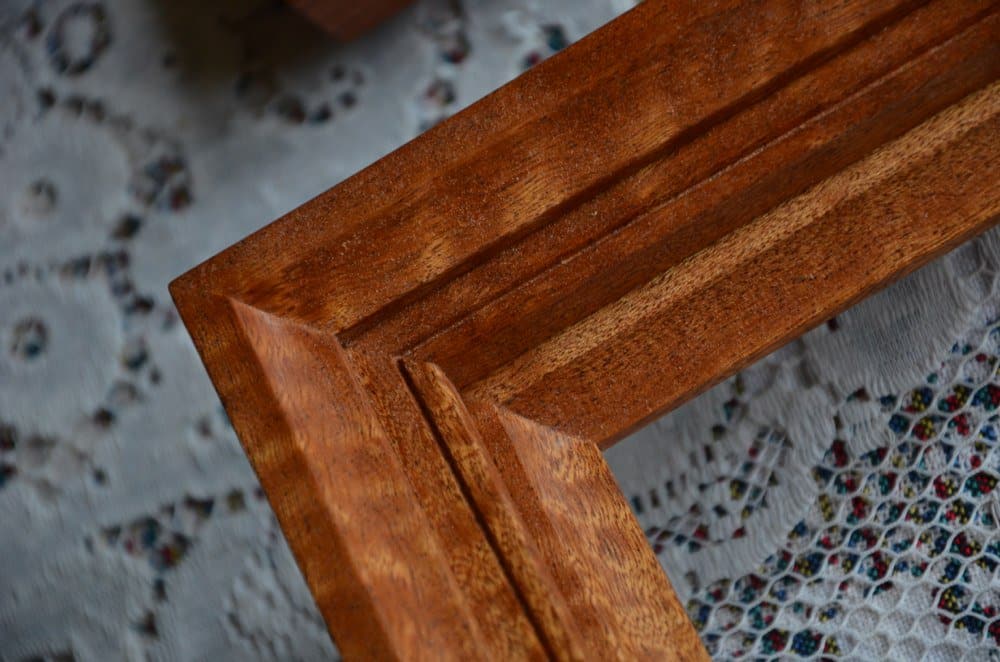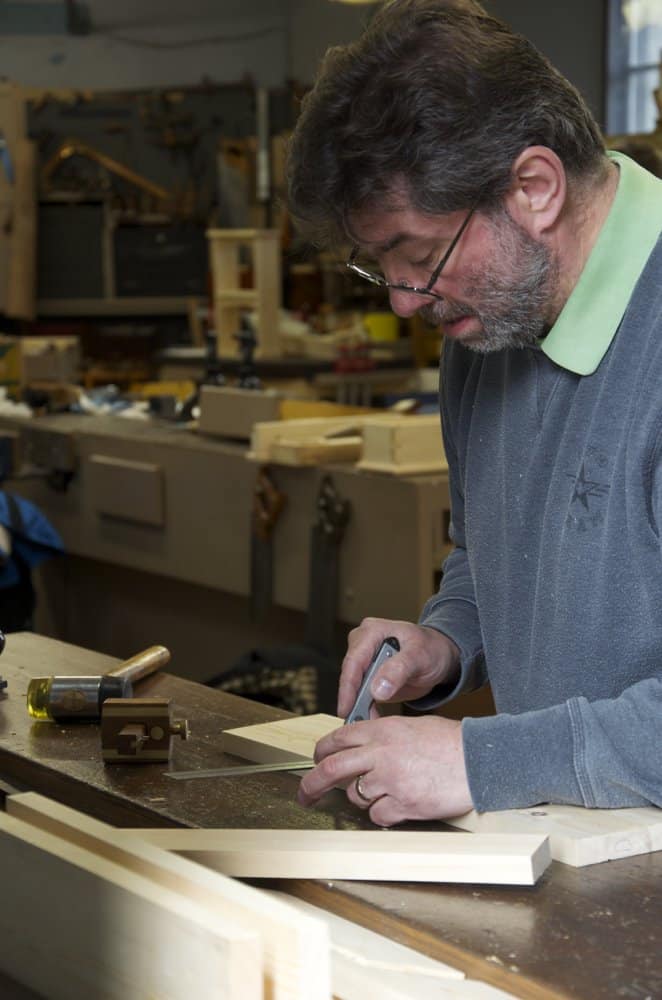Working for yourself



A man, well, a new friend really, asked me today if I were to start a business and keep my current job going for income whether I would just make one of something or more than one. I think not just one if starting out as an unknown. I believe in small batch productions and believe people like choices too. I’d prefer to see a few designs and several in each design using different woods and wood combinations. Batch production economises our work and maximises efficiency, mostly in the machine realm, because we generally cut second and third items to the same dimensions at a small fraction of the cost because of set-up time. When it comes to hand work of course the time-saving factor doesn’t generally stack up the same way and so it doesn’t change as much but it does still help. Going to shows with a wide variety of goods can often be less dynamic than taking several of each kind—perhaps in different woods, colours and finishes. Having one of each really offers only the choice you take to the shows or sales venues whereas colour and wood adds choice and a sense of the customer being involved in the choosing process. Generally speaking I think taking several of the same product also shows the confidence you have in what you’ve made. Also, I think too much can be too invasive. Giving space to your product in a world of mass choices sets your work out for greater clarity and visibility and dispels duplicity.
Can you make a living from woodworking?



This question comes up frequently enough and over recent years I’ve personally heard four magazine editors tell me that no one can make a living from woodworking. I have heard this from other quarters too. I find it tiresome when I hear it but there you are. In this I would say how very wrong they are. Of course we, me and they, move in completely different realms, different circles and have different aspirations too. I’d rather be self employed and determine how, where and when I work even if it means working twice as long and twice as hard as everyone else. They’re tasked for advertising media sales and most often know very little about business spheres beyond that or for that matter, beyond one or two of them maybe, much about woodworking in real terms either. For me it was never a question of whether I could or whether I would or how much I can make but making it work for me and my family. You can of course make a decent living making product from wood provided what you set your sights on is realistic. You must strategise to that end and work your plan into a lived and vibrant reality. Cutting boards and walking canes of beauty sell well for good prices and I’ve proved that in my own life. Picture frames framing fine art work and graduation certificates have higher value than mass-made high quality ones when customers know you or have met you and know that you made them by hand.



Personally I don’t listen to anyone telling me I can’t make and sell furniture enough to make a living from because of course I can. I think everyone can provided they’ve paid the price to become competent woodworkers. You don’t really need a nine-month course to do this and it may not even help you too much, though it might. Just develop some basic skills and get going. As you progress be contented and don’t despise small things at all. They can quickly become bread and butter. With such small things you can establish income, open new relationships, become known. You don’t need to stack up a multi-thousand pound debt or expense to do any of this. You just develop as you go and go further and further as you grow.
Furniture pieces made to the right design and to a good standard will always sell. It’s not complex at all, but it will take time, even a few years, to get the cycle of customers going to support you. You have to work to that end, but the work is well worth it if you want to become true to yourself and attain to lifestyle woodworking. It all begins with mastering skills. There is of course much more to this conversation. Perhaps we should continue.


i think most woodworkers would like to make their hobby a living, but when the deadlines start nipping at you heels that hobby can seem very much like a job, i’d love to hear more on this subject
I used to think that too, but then I started setting the deadlines of when I wanted to make the piece and then when I wanted to arrange for pick up or delivery. I could add a day or a week or a month to the completion date of I wanted to. My customers paid for the design and the making of it but not the control of my life or my shop.
Would you advise someone starting out to avoid offering customized, bespoke work? It seems such work would require substantial experience and could lead to disappointed customers and stress from struggling to meet time and cost expectations.
I think each person must know their limitations and work accordingly. Some of the men even new to woodworking seem always to capably run ahead of everyone else and never struggle whereas others struggle much of the time but are always determined to master their newfound craft.
You are generally in the driving seat. As a matter of standard procedure for me I always gave a completion time and then added a week. That way if something went wrong I had time to make adjustments and deliver on time.
Thank you for your insights. If at some point you wrote a blog entry about how one sets prices for furniture, especially as a new and unknown craftsman, it would be helpful and well received, I’m sure.
when i have the skill you have i’ll also have the confidence to dictate the delivery time but until then i’ll just have to panic or say sorry its late. (i can always dream about coming close to your skill level)
I would look forward to more on this topic. I find them inspiring as I’m currently taken little leaps to do it for a living. I find great reward to see me little one get of the school bus everyday were if I worked for someone is miss that.
I too would like to read some more thoughts. I’ve been mulling over this kind of thing a lot more lately. Thank you for all the wisdom, insight and for passing on your skills!
Hello, Paul. I sincerely appreciate your all-encompassing tutelage that you have been providing over the years. I am beyond the “acquiring things” period in my life and have been leaning toward getting off the conveyor as you say. Today’s entry answered one of the biggest questions that I have had. Further knowledge you could pass on in your blog would be invaluable.
Hello Paul,
I was fascinated by your dovetail box videos so I decided to make boxes until I consistently cut gap free dovetails and plane flat tops and bases. I’m getting better and have begun to wonder if I could eventually sell any of the ones that get really good. I’ve also wondered how I should approach the sales process. Should I mass produce one size box in one type of wood? I know my answer…no. Thanks Paul. I was feeling like I should have variety but was a little confused in what direction I should go. Dovetail boxes made in different sizes with different colors and woods makes sense.
Thanks, Paul. That was very encouraging.
Looking at the pictures accompanying this post make me think three things.
1) I really want to do that.
2) I wonder if any of these were taken while my wife wandered around the castle and heard Paul’s dulcet tones on Saturday last.
3) A quick video on finishing spoons would be really nice. I’ve read a lot about what *not* to use to finish them if you plan to eat off them, but not much about what *to* use, or how.
Super post again, as ever.
I too, as some of the above, am interested in learning about pricing. It’s something I’ve often wondered.
Aiden McEvoy has a small dovetail box for £200. http://amfinefurniture.co.uk/editions/trial-day-keepsake-box/
Clearly he is an experienced craftsman – I am not (yet). What is a reasonable price point to start pitching something given my currently low skill levels?
The important thing always to remember is that we are not in competition with one another as creative questers but searching for ways we can make our living and developing a lifestyle that supports the way we choose to live as crafting artisans. Most people always look at the price something sells for to measure their success by. I find it the more important thing to more measure whether we have achieved a lifestyle we can afford with what we earn to be contented with that. Most of the creative people I have met seem more to be discontented or even unhappy because they want one or both of two things. One is they want to measure their success by how much they sell what they made for and, two, they want always to be accepted and admired for their success in those realms and by their peers. Price and recognition validate them and rarely are they contented being validated by simply being workmen and women skilled in their work.
I see this as a wonderful alternative to an overpriced college education.
Hi Paul, this is all very timely for me. I have been wanting to make a living from working wood for a few years now. I am about to start. I am training myself through your Masterclasses (I am an apprenticed trained engineer and draughtsman from the 1980s. I have been many other things since). I am intending to make much of the furniture etc. we need for our house, thus reducing the impact of my lost income and at the same time building up a portfolio and much experience. Recently I turned down the offer to make something for a friend – lack of confidence! I quickly felt I had learnt the need to jump at such opportunities in future. But, somebody else has approached me with the offer of some work and I am going to take this on.
I am learning that this is not just about learning to work wood but its also, obviously, about how to clarify customers needs and to be able to offer choices e.g. design, type of wood, type of finish. This is about learning to run a business from my own home so there are things like the potential of having to pay business rates to consider (this depends on ‘other’ usage of a particular space). This is about remembering to keep other distractions from my work space when I am learning – tiny things soon eat up my training time.
There are a few hurdles to jump before I can say with certainty that I have moved from being a teacher to fully starting to train and then earn a living from working wood but I have at least started two days a week, perhaps more mentally than physically. This thought process is though important I feel as all of this represents a big challenge and change for me. I guess I want to say to others that if, like me, you are trying to cross some kind of a threshold here then yes I have found it scary and it is easy to feel despondent one minute and full of excitement the next. I know also that if I do not give this a go I will regret having not tried. I think the biggest sense of failure that could come from this is having not dared to try; not a legacy I want for my son. At least if we do not have much money we will have nice furniture to sit on!
As ever Paul et al. I feel that what you are doing is incredible.
All the best. Neil.
Excellent, inspiring post. I thoroughly enjoy this type. Thanks you for everything
I have been inching towards this goal for years, not even knowing it was my goal. It is a moment of satisfying clarity to finally know that it is indeed my goal. I have been discouraged in the past at what I have seen and generally accepted that a person ( someone who doesn’t have great connections and great luck coupled with great skill) cannot make a living from woodworking alone. It seemed to me that for a vast majority you have to complement woodworking with another pursuit.
Those of us who live in areas away from traditional woodworking apprenticeships are playing a difficult game of catch-up (seemingly impossible at times). Thanks to you Paul, I have been shown a way to move forward without living in one of those areas. You’ve inspired me and obviously many others. I am not looking for an extravagant lifestyle, but a modest one that will transition me to a life more on my own terms, and one that I can involve my family in as well. For that I thank you very much.
My oldest son, who is 6, and youngest daughter, who is 5, have both been right there with me in my workshop for years now since I switched to hand tool woodworking following your instruction. They are not just passive bystanders either; they have their hands working the tools right there with me or beside me. Not only do they get the understanding and satisfaction of seeing a project go from log to functional tools or decoration, but we also get to spend that time together, something that isn’t afforded by my career in an office setting.
God Bless you Paul and your Team for what you have contributed to my life and so many others. Keep up the excellent work.